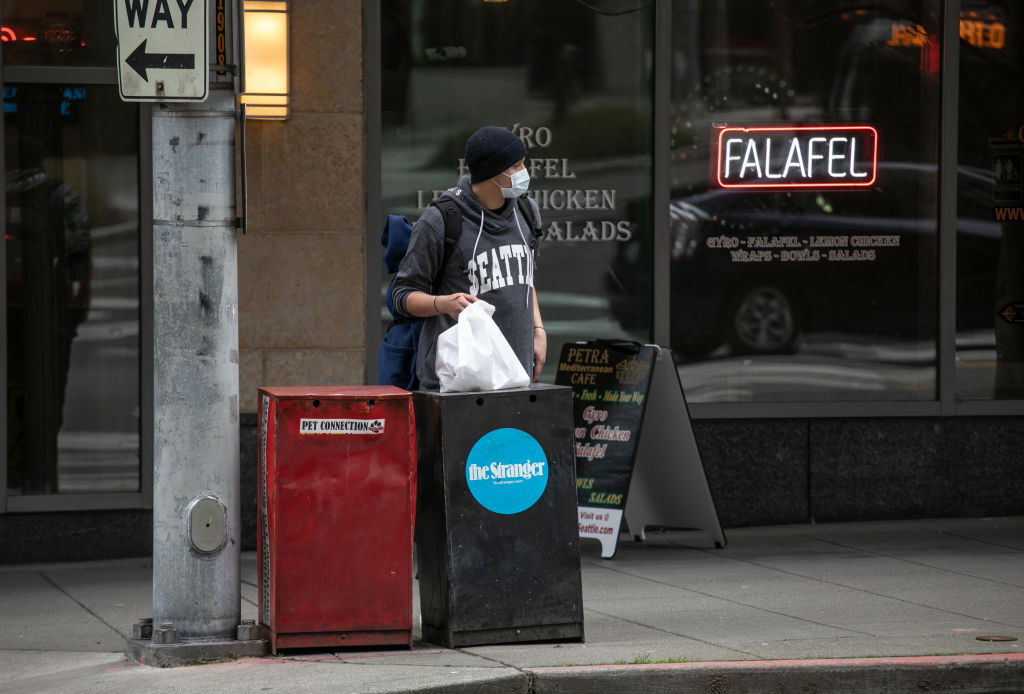A Seattle lab uncovered Washington's coronavirus outbreak only after defying federal regulators


A free daily email with the biggest news stories of the day – and the best features from TheWeek.com
You are now subscribed
Your newsletter sign-up was successful
A lack of test kits for the new COVID-19 coronavirus is still obscuring the extent of the outbreak in the U.S., but for a critical period in February, there were no functional federal tests and "local officials across the country were left to work blindly as the crisis grew undetected and exponentially," The New York Times reports. The coronavirus has now infected more than 1,000 people in 36 states and Washington, D.C., according to Johns Hopkins University's count.
The first U.S. outbreak was in Washington state, where authorities confirmed the first patient — suffering from respiratory problems after visiting Wuhan, China — only after the Centers for Disease Control and Prevention made an exception to strict testing criteria. In Seattle, Dr. Helen Chu, an infectious disease expert who was part of an ongoing flu-monitoring effort, the Seattle Flu Study, asked permission to test their trove of collected flu swabs for coronavirus.
State health officials joined Chu in asking the CDC and Food and Drug Administration to waive privacy rules and allow clinical tests in a research lab, citing the threat of significant loss of life. The CDC and FDA said no. "We felt like we were sitting, waiting for the pandemic to emerge," Chu told the Times. "We could help. We couldn't do anything."
The Week
Escape your echo chamber. Get the facts behind the news, plus analysis from multiple perspectives.

Sign up for The Week's Free Newsletters
From our morning news briefing to a weekly Good News Newsletter, get the best of The Week delivered directly to your inbox.
From our morning news briefing to a weekly Good News Newsletter, get the best of The Week delivered directly to your inbox.
They held off for a couple of weeks, but on Feb. 25, Chu and her colleagues "began performing coronavirus tests, without government approval," the Times reports. They found a positive case pretty quickly, and after discussing the ethics, they told state health officials, who confirmed the next day that a teenager who hadn't traveled abroad had COVID-19 — and the virus had likely been spreading undetected throughout the Seattle area for weeks. Later that day, the CDC and FDA told Chu and her colleagues to stop testing, then partially relented, and the lab found several more cases. On Monday night, they were ordered to stop testing again.
"In the days since the teenager's test, the Seattle region has spun into crisis, with dozens of people testing positive and at least 22 dying," the Times notes. "The scientists said they believe that they will find evidence that the virus was infecting people even earlier, and that they could have alerted authorities sooner if they had been allowed to test." Read more about the red tape at The New York Times.
A free daily email with the biggest news stories of the day – and the best features from TheWeek.com
Peter has worked as a news and culture writer and editor at The Week since the site's launch in 2008. He covers politics, world affairs, religion and cultural currents. His journalism career began as a copy editor at a financial newswire and has included editorial positions at The New York Times Magazine, Facts on File, and Oregon State University.
-
 Bad Bunny’s Super Bowl: A win for unity
Bad Bunny’s Super Bowl: A win for unityFeature The global superstar's halftime show was a celebration for everyone to enjoy
-
 Book reviews: ‘Bonfire of the Murdochs’ and ‘The Typewriter and the Guillotine’
Book reviews: ‘Bonfire of the Murdochs’ and ‘The Typewriter and the Guillotine’Feature New insights into the Murdoch family’s turmoil and a renowned journalist’s time in pre-World War II Paris
-
 Witkoff and Kushner tackle Ukraine, Iran in Geneva
Witkoff and Kushner tackle Ukraine, Iran in GenevaSpeed Read Steve Witkoff and Jared Kushner held negotiations aimed at securing a nuclear deal with Iran and an end to Russia’s war in Ukraine
-
 A Nipah virus outbreak in India has brought back Covid-era surveillance
A Nipah virus outbreak in India has brought back Covid-era surveillanceUnder the radar The disease can spread through animals and humans
-
 Trump HHS slashes advised child vaccinations
Trump HHS slashes advised child vaccinationsSpeed Read In a widely condemned move, the CDC will now recommend that children get vaccinated against 11 communicable diseases, not 17
-
 Covid-19 mRNA vaccines could help fight cancer
Covid-19 mRNA vaccines could help fight cancerUnder the radar They boost the immune system
-
 FDA OKs generic abortion pill, riling the right
FDA OKs generic abortion pill, riling the rightSpeed Read The drug in question is a generic version of mifepristone, used to carry out two-thirds of US abortions
-
 The new Stratus Covid strain – and why it’s on the rise
The new Stratus Covid strain – and why it’s on the riseThe Explainer ‘No evidence’ new variant is more dangerous or that vaccines won’t work against it, say UK health experts
-
 RFK Jr. vaccine panel advises restricting MMRV shot
RFK Jr. vaccine panel advises restricting MMRV shotSpeed Read The committee voted to restrict access to a childhood vaccine against chickenpox
-
 Texas declares end to measles outbreak
Texas declares end to measles outbreakSpeed Read The vaccine-preventable disease is still spreading in neighboring states, Mexico and Canada
-
 RFK Jr. shuts down mRNA vaccine funding at agency
RFK Jr. shuts down mRNA vaccine funding at agencySpeed Read The decision canceled or modified 22 projects, primarily for work on vaccines and therapeutics for respiratory viruses
